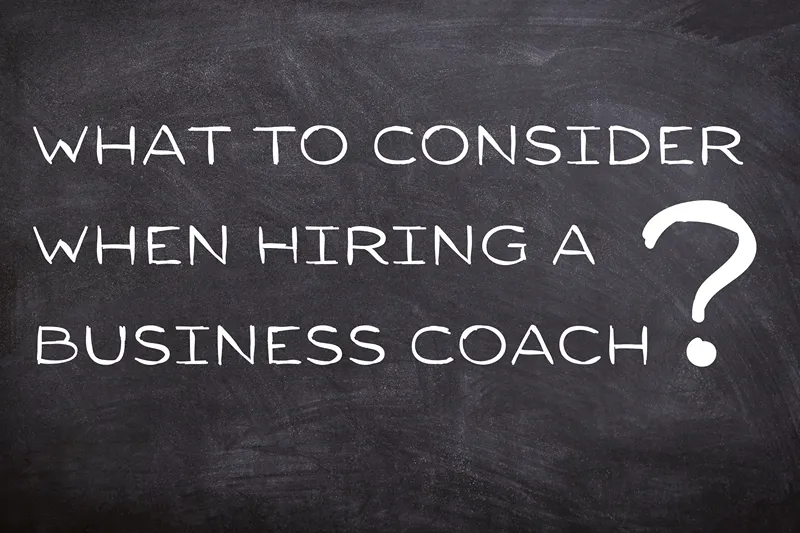What to Consider When Hiring a Business Coach?
 Looking for a Business Coach?
Looking for a Business Coach?
Business coaching is an industry that is well over 30 years old and may even unofficially be over 40 years old, with 20% to 35% of business owners using a coach. While many are familiar with the term “Business Coach,” not everyone knows how business coaching works, how it can benefit them, or what needs to be considered when hiring one.
This article will share insights that have been helpful to my family, friends, and fellow entrepreneurs when hiring a business coach.
Fun
First and foremost, your relationship with your coach should be fun. Business ownership should be enjoyable, and since we spend so much time thinking about and at work, working in our businesses, the relationship with your coach should also be enjoyable.
Financially Beneficial
What is the plan to “find the fee”? A coach should demonstrate strategies that will increase your revenue and profit in the short and long term to cover their fee. If a prospective coach cannot demonstrate these strategies and timelines, do not hire them.
A strong, competent, and experienced business coach should improve your profit by at least their fee within 4 to 6 months of starting the engagement. For example, if the typical fee is $3,000 per month, your business should see this increase in profit.
Once the “initial fee” is covered, the next profit layer should be a minimum of 5:1 ROI in the first 12-18 months and then a 10:1 ROI. For instance, if the coaching fee is $36,000 per year, there should be a $360,000 per year improvement in profit or equivalent benefit to the organization.
It is also critical that the coach provides a plan to track the results of the program.
Faster Results
Simply put, will you and your business achieve the same or greater results faster than you would without using a coach?
Guarantee
Does the prospective coach guarantee results? With over 30 years in the industry, there are proven methods and strategies to help you achieve your goals. If a prospective coach cannot offer a guarantee, keep looking.
Expertise & Experience
Caveat Emptor, let the buyer beware. You have no excuse for not finding and working with an experienced business coach. In an industry older than Google, Facebook, and social media, you need a coach with a proven track record. Consider the prospective coach’s industry knowledge, track record, and relevant certifications and credentials.
Hours Learning Per Year
Hours spent learning are crucial for many reasons. The top reason is whether the business coach dedicates time each year to learning and studying all things related to business coaching and their area of expertise. This includes attending conferences, staying updated on marketing strategies, leadership, management, financial knowledge, industry trends, and improving communication skills.
Another reason to assess a prospective coach’s free time learning is that the coaching world is easy to enter, with many calling themselves “business coaches” without ongoing education. Ensure your coach is committed to continuous learning.
Another way to assess expertise and experience is by reputation. Look for online reviews, testimonials, and client success stories to gain insight into the coach’s effectiveness, style, and impact.
Long-Term Support
A successful business coaching relationship can last for several years. Ask how the prospective coach handles and works with their clients throughout various growth stages, both business and personal. Does the coach provide other resources or expect you to source all the necessary tools? Additionally, does the coach have access to a network of other professionals to support your needs?
Coaching Style and Approach
The coaching style of the prospective coach should not be discernible by you. A great coach will adjust their style to make you feel welcome, heard, and understood. They should switch between the communication style you like and the one you need. A successful coaching relationship is about what you need to achieve your vision and goals.
Communication Skills
Effective communication skills are essential. Evaluate the coach’s ability to communicate complex concepts clearly and understandably. Their listening skills are equally important—assess their ability to hear what you say and rephrase it in a way that reflects your words, feelings, and intentions. Constructive and actionable feedback is vital. The coach should provide insights that challenge you and offer actionable strategies and direction.
Personal Development
This is the most important aspect of your relationship with a business coach. Most entrepreneurs seek a business coach to solve a problem, overcome an obstacle, and achieve business objectives like revenue targets, sales goals, or profit improvements. To change your business results, you must change. A coach’s job is to grow your mindset, leadership skills, communication skills, emotional intelligence, and other critical decision-making skills so you can continue to grow and scale your business and the people around you.
By carefully considering these factors, you can find a business coach well-suited to help you achieve your business goals and foster your growth as a business leader.
Kent Boehm
Nine Business Group
ActionCOACH



